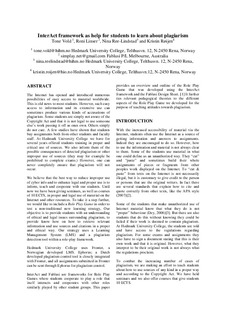InterAct framework as help for students to learn about plagiarism
Lecture
Permanent lenke
http://hdl.handle.net/11250/134791Utgivelsesdato
2008Metadata
Vis full innførselSammendrag
The Internet has opened and introduced numerous possibilities of easy access to material worldwide. This is old news to most students. However, such easy access to information and its extensive use can sometimes produce various kinds of accusations of plagiarism. Some students are simply not aware of the Copyright Act and that it is not legal to use someone else?s work passing it off as ones own. Others simply do not care. A few studies have shown that students buy assignments both from other students and faculty staff. At Hedmark University College we have for several years offered students training in proper and critical use of sources. We also inform them of the possible consequences of detected plagiarism or other improper use of sources (they may for example be prohibited to complete exams.) However, one can never completely ensure that plagiarism will not occur. We believe that the best way to reduce improper use of cyber info and to enhance legal and proper use is to inform, teach and cooperate with our students. Until now we have been giving seminars, as well as courses of 10 ECTS, in proper and legal use of material on the Internet and other resources. To take it a step further, we would like to include a Role Play Game in order to test a non-traditional new learning strategy, Our objective is to provide students with an understanding of ethical and legal issues surrounding plagiarism, to provide know how on how to retrieve relevant information and use sources and citations in a proper and ethical way. Our strategy uses a Learning Management System (LMS) and a plagiarism detection tool within a role-play framework. Hedmark University College uses Fronter, a Norwegian developed LMS. Ephorus; a Dutch developed plagiarism control tool is closely integrated with Fronter, and all assignments submitted in Fronter can be sent through Ephorus for plagiarism control. InterAct and Fablusi are frameworks for Role Play Games where students cooperate to play a role that itself interacts and cooperates with other roles similarly played by other student groups. This paper provides an overview and outline of the Role Play Game that was developed using the InterAct framework and the Fablusi Design Sheet. It further ties relevant pedagogical theories to the different aspects of the Role Play Game we developed for the purpose of teaching attitudes towards plagiarism.
Beskrivelse
Konferansebidrag på: ITHET07. 8th International conference on information technology based higher education and training.
